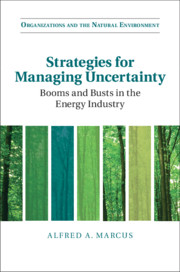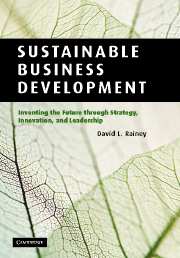Strategies for Managing Uncertainty
All organizations must cope with future uncertainties. These uncertainties affect the strategic choices they make. They must commit scarce organizational resources to future outcomes which they have little assurance will come into being. Marcus explores how decision makers in the energy industry made choices in the face of such uncertainties, specifically examining two major uncertainties they confronted in the 2012–18 period - price volatility and climate change. Marcus tells the story of how different companies in the integrated oil and natural gas sector and in the motor vehicle sector responded to these uncertainties. In the face of these challenges, companies in the energy industry hedged their bets by staking out paradoxical or contrasting positions. On the one hand, they focused on capturing as much gain as they could from the world's current dependence on fossil fuels and on the other hand they made preparations for a future in which fossil fuels might not be the world's dominant energy source.
- Proposes a new strategic management approach to managing uncertainty
- Develops a theory of hedging as an approach to managing this type uncertainty, illustrated with examples from the integrated oil and natural and motor vehicle sectors
- Explores in depth two major uncertainties that companies in these sectors face - energy price volatility and the threat of climate change - providing case studies of how the major companies have responded
Reviews & endorsements
'Alfred A. Marcus has been a pioneer in exploring how corporate managers deal with uncertainty. Now he has developed a set of deep case studies in how the leading players in the energy sector have responded to the quotidian challenge of volatile energy prices and the existential threat of climate change. In showing how these corporations have evolved various ways to hedge their way forward operationally, Marcus demonstrates how profoundly irrelevant the traditional fixation of economists on optimizing investments is when the information required to define an optimal strategy simply does not and cannot exist. Thus, Marcus’ contribution transcends the bounds of his study of the energy sector, critically important as the future of that sector is to the world, to make a rich contribution to an emergent economics discipline that seeks to embrace the conditions of radical uncertainty under which business decisions are necessarily made.' William H. Janeway, author of Doing Capitalism in the Innovation Economy
Product details
March 2019Hardback
9781107191150
564 pages
235 × 157 × 33 mm
0.92kg
38 b/w illus. 14 tables
Available
Table of Contents
- Introduction: calculated wagers and hedging
- Part I. The Problem:
- 1. Risk and uncertainty in the energy industry
- 2. The management of risk and uncertainty
- 3. Hedging in the energy industry
- 4. Booms and busts in the energy industry
- Part II. Challenges in Major Sectors:
- 5. The oil and natural gas sector
- 6. The motor vehicle sector
- 7. The electric utility sector
- Part III. Oil and Natural Gas Company Strategies:
- 8. Strategies to try to offset plummeting prices: Exxon Mobil
- 9. Strategies to try to offset plummeting prices: BP
- 10. Strategies to try to offset plummeting prices: Shell
- 11. Strategies to try to offset plummeting prices: Total
- Part IV. Motor Vehicle Company Strategies:
- 12. Strategies to take advantage of plummeting prices: GM
- 13. Strategies to take advantage of plummeting prices: Ford
- 14. Strategies to take advantage of plummeting prices: VW
- 15. Strategies to take advantage of plummeting prices: Toyota
- Part V. Conclusion:
- 16. Oil and gas companies strategic moves 2017–18
- 17. Motor vehicles companies strategic moves 2017–18
- 18. Ambivalence, paradox, and hedging.







